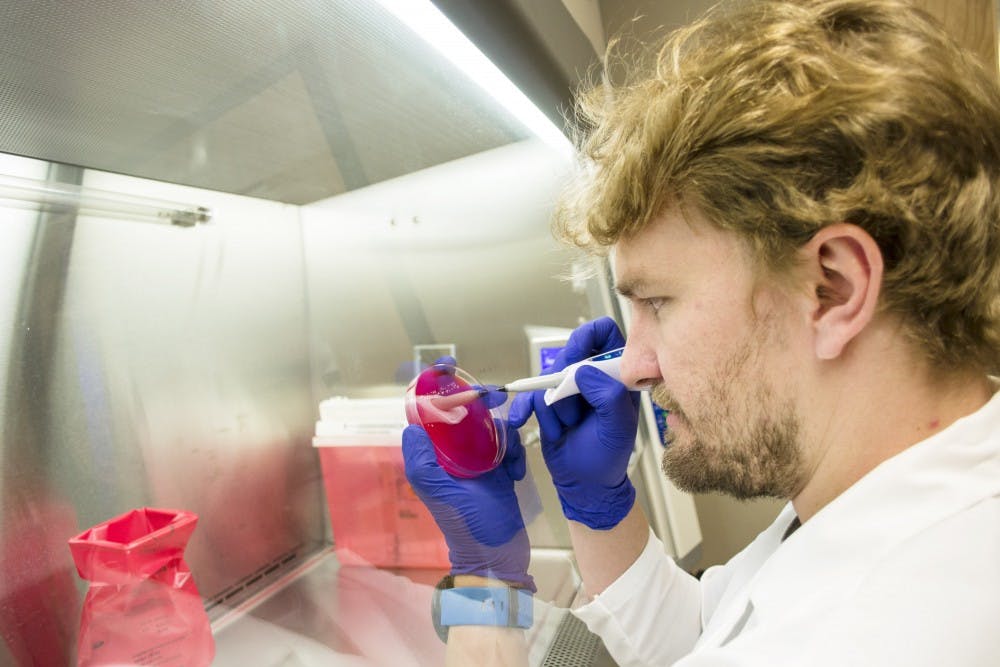Assistant professor Dr. Pamela Hall and her team of researchers are working on developing a new method to combat infections by Staphylococcus aureus, commonly known as staph. Notorious for developing resistance to antibiotics, staph is a type of bacteria that most often causes skin infections but can sometimes enter the bloodstream and be life-threatening.
Without effective antibiotics the world could see the return of an era in which a minor infection is fatal, prompting scientists to scramble to find a different way to combat these bugs.
Staph is extremely common. According to the Centers for Disease Control, one in three people have some form of staph living on their skin or in their nose, while two in 100 people have a more dangerous, antibiotic-resistant type more commonly known as MRSA. Staph infections cause nearly 11,000 deaths in the U.S. annually – about half of which are attributed to MRSA.
Exactly why some people develop an infection from these common bacteria while others never do is unknown, Hall said, although infection is more likely to occur in people with weakened immune systems, such as hospital patients.
Hall and her team have identified active compounds that effectively shut down the ability of bacterial cells to communicate with one another - a novel treatment option for bacterial infections.
“Staph uses a communication system known as quorum sensing where it secretes these peptides that tell all the other staph in the neighborhood ‘OK, we’re getting ready, we’re going to change all our gene expression and start making this bad stuff that allows us to get through the tissue.’ When they’re just normally hanging out in your nose or wherever, they’re not making this,” Hall said.
This method effectively cripples the bacteria, allowing the immune system to target it more effectively, said Seth Daly, a graduate student working on the project.
“Additionally, because this strategy does not inhibit bacterial growth, it is thought that these molecules will not induce resistance development,” Daly said.
Staph is a particularly nasty bug with a slew of protection and assault tactics, explained Hall, including outwitting and even attacking cells of the immune system, making it difficult for the body to clear the infection on its own.
Because of this, people do not develop a natural immunity to staph after one infection, as they would with other infections such as chickenpox.
Additionally, staph can arrange itself into a “biofilm” where the bacterial cells adhere to one another, forming a giant mass on the surface of the skin, she said. Bacteria in a biofilm formation are harder to kill with antibiotics.
Get content from The Daily Lobo delivered to your inbox
All of this has led to a call for alternative methods to target and treat infections, Hall said. Since staph commonly exists on people in a non-harmful form, she is developing a treatment that, instead of killing the bug, targets the components that make it harmful, she said.
“We are looking at ways to combat the virulence of the bugs, or disarm them, so they can’t make the toxins and other things that they make which actually cause most of the damage to the host,” Hall said.
While it has yet to be tested in humans, Hall said she hopes that this method can be developed into a topical treatment for staph infections and to sterilize open wounds and surgical sites. Additionally, both Hall and Daly said they believe this will show that this type of treatment is viable and can be adapted to target many other types of bacteria.
“I hope this work will open new avenues for treatment strategies to combat bacterial infection. The current state of antibiotic resistance and lack of novel antibiotics in development urgently requires evaluation of novel strategies,” Daly said. “We hope to one day see virulence inhibitors used in the healthcare setting either alone or in combination with antibiotics.”
Hall’s lab is also working to develop a vaccine against staph by targeting the toxic factors secreted by the bacteria, and the team is trying to determine what makes certain people more susceptible to infection than others.
Lauren Topper is a freelance reporter at the Daily Lobo. She can be contacted at news@dailylobo.com, or on Twitter @DailyLobo.






